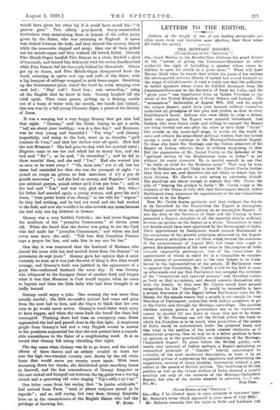LETTERS TO THE EDITOR.
[Letters of the length of one of our leading paragraphs arc often more read, and therefore more effective, than those which fill treble the space.] THE MONTAGU REPORT.
[To rez EDITOR OF THE " SPECTATOR."]
Sia,—Lord Morley in his Recollections discloses his great horror at the " notion of giving the Lieutenant-Governor or other authority the right of forbidding a speaker whose views he dislikes to open his mouth in a given area! " What will Lord Morley think when he knows that within ten years of his writing the above-quoted sentence liberty of speech had moved forward on the wings of enlightenment at such a rapid rate that the authority to forbid speakers whose views he disliked developed from the Lieutenant-Governor to the Secretary of State for India, and the " given area " was transferred from an Indian Province to the whole of the United Kingdom of Great Britain and Ireland. The " momentous" declaration of August 20th, 1917, and its sequel the unique Report, could have been boomed without trampling underfoot all principles of fair play and justice, so dear to every Englishman's heart. Indians who were likely to raise a dissen- tient voice against the Report were muzzled beforehand. And Indians who were found ready and willing to support the Report are being trotted out one after the other to have their " turns " like artists on the music-hall stage, to invite all the world to come and admire the magnificent political wisdom that lies buried among a mass of verbiage in the Montagu-Chelmsford Report. To those who know Mr. Montagu and the Indian admirers of his Report on Indian reforms there is nothing surprising in this. But the appearance of Mr. Lionel Curtis as the defender of the "political section of the Brahminioal caste in India " is not without its comic elements. He is careful enough to say that " he holds no brief for the Brahmin caste." That may be true, for the Brahmins are not likely to trust Mr. Lionel Curtis further than they can see, and therefore are not likely to retain him for their defence. Mr. Curtis is only acting as advocates diaboli. His pleadings are clever enough to sustain that role. Under the plea of " keeping the pledges to India " Mr. Curtis urges in the columns of the Times of July 24th that Government should, before Parliament rises, announce the appointment of the two Committees referred to in the Report.
Now Mr. Curtis knows perfectly well that without the details to be furnished by the Committees the Report is incomplete. Parliament cannot form its opinion on an incomplete Report. It was the duty of the Secretary of State and the Viceroy to have presented a Report, complete in all the essential details, sufficient to form an opinion on the Report ae a whole. Committees to work out details could have been appointed by the Government of India Their appointment by Parliament would commit Parliament to the acceptance of the general principles advocated in the Report. These general principles are not those which formed the substance of the announcement of August 20th, but those that ought to govern the demarcation of the next stage in the progress of India towards responsible government. One of the Committees the appointment of which is asked for is a Committee to consider what powers of government are in the •near future to be trans- ferred to the representatives of the people. If Parliament were to appoint this Committee, Mr. Curtis would be the first to come up afterwards and say that Parliament has accepted the principle of the " transferred and reserved powers," and therefore cannot go back on that acceptance, and should concern themselves only with the details. In that case Mr. Curtis would have secured recognition for his " diarchy." It would be impossible to have a proper discussion of the Report before Parliament rises for the Recess, for the simple reason that a month is not enough for busy Members of Parliament, unfamiliar with Indian questions, to get
at the Curtis core through the Montagu camouflage. The question whether certain powers of government are to be transferred cannot be decided till you know to whom they are to be trans- ferred. If Mr. Montagu can tell the British public the basis on which his franchise is to be based, what proportion of the people of India would be enfranchised under the proposed basis, and
also what is the position of the newly created electorate as to educational progress, then we may be in a better position to form an opinion as to the practicability or otherwise of the Montagu-
Chelmsford Report. To place before the British public, ordi- narily very ignorant of Indian matters, a Report embodying an unheard-of principle of " diarchy " heavily camouflaged by
verbosity of the most exuberant description, to boom it by an
organized system of suppressing the opponents and advertising the supporters, savours of sharp practice, fortunately without a pre- cedent in the annals of British polities. The traditions of British politics as well as the future welfare of India demand a careful scrutiny not only .of the contents of the Montagu-Chelmsford Report, but also of the tactics adopted to advertise it.—I am,


























 Previous page
Previous page